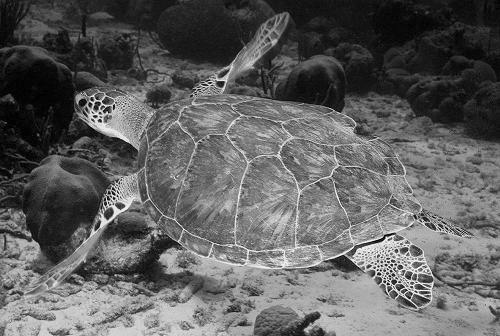Posted 04/09/2012
Kitty Simonds, executive director of the Western Pacific Fishery Management Council, has made little secret of her wish to see the protected status of the green sea turtle removed. This legislative session, she found an ally in Rep. Fay Hanohano, who introduced House Resolution 61 and House Concurrent Resolution 87, which (if adopted) would have urged the National Marine Fisheries Service to “recognize the recovery of the Hawaiian green sea turtle and begin active management of this important species” and to “delist it from the threatened list under the Endangered Species Act.”
Then the resolutions were hijacked. On April 5, the House Committee on Water, Land, and Ocean Resources was set to hear the two identical resolutions – but now they were proposed to have nothing at all to do with turtles and instead were calling on the Office of Planning to work with Honolulu government officials to develop a master plan for Koreatown.
Support for the original measures was submitted by the Association of Hawaiian Civic Clubs (which included a statement by Simonds), two former council members (one of whom has been employed as a contractor by Wespac in recent years), and a current council staff member, Josh DeMello, who scolded the Legislature for its sleight of hand.
“Why does [the proposed resolution] totally change the resolution from green sea turtles to koreatown?” DeMello’s emailed testimony states. “This is a sham being perpetrated by the legislature by noticing for honu and changing the bill to something completely different. If you wanted a koreatown reso, you shouldve submitted one. Cannabalizing an existing one is shameful and arrogant. Let the honu resolution stand and do not accept the … proposed bill” [sic].
The resolutions state that “scientific studies as well as reports by Native Hawaiian lawaia (cultural practitioners of fishing) have concluded that the honu is approaching full recovery and that the environment and ecosystem are suffering from the current over-production, over-population, and lack of management of honu.”
By the afternoon of Monday, April 8, the Koreatown language had been inserted into another resolution, HCR 168, which had originally urged the formation of Community Concerns Councils for rural areas.
In the end, the WLO committee decided to defer action on the honu resolution, but not before Simonds submitted further testimony as president of the Maunalua Hawaiian Civic Club. “Access to honu, another of our traditional resources, is severely restricted under the [Endangered Species Act,” she wrote.



Leave a Reply